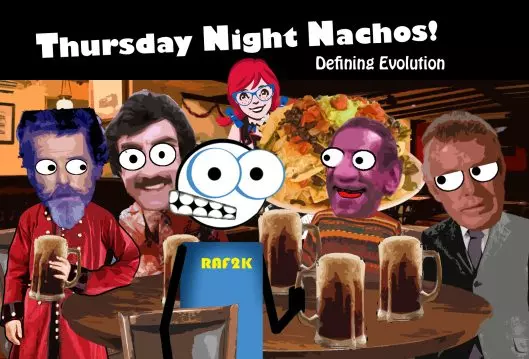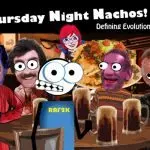The video above will sum up the key points of this chapter- in this case, the problems with “survival of the fittest”. The full chapter, which features Rent-A-Friend and his fellow Nacho-eating arm chair philosophers, can be read below. Enjoy! #JesusLovesYou
To read other parts of this series click here
Ordinarily I begin at the start of a new Thursday, but there was a conversation which the lads and I had during the end of our weekly run at Nacho hill at Danny’s Bar, Grill, and House of Rabblerousing which I think was worth retelling.
Before our Nachos came to the table, I had said, “Being the first carrier of the lucky new gene doesn’t help you, and doesn’t even help you pass it along to the next generation. Getting that new gene into the population and expressed as new features is truly just dumb luck.”
And Blue Beard had replied in his cheeky manner, “T’was the idea of Darwin’s book, wasn’t it? Survival of the Just Dumb Luckiest?”
And while we were munching on the week’s Nacho intake, I got to thinking about Darwin’s Original idea, survival of the Fittest, and I started to get ideas.
“Hey,” I said, once our assault on the Nachos had begin to subside, “have you guys ever really considered Darwin’s idea of Survival of the Fittest?”
“Is it finally dawning on you that something Darwin wrote is so obvious that even you can’t deny it?” asked Carl, full of vinegar, emotionally speaking.
“Actually, quite the opposite,” I said. “I’m starting to think that he’s even wrong about that.”
“Oh, come now,” said Carl. “How can you doubt something so obvious?”
“Well, why don’t you explain the idea to us,” I suggested, “and we’ll see what we can discover?”
“The idea is simple,” Carl began. “Natural Selection works to eliminate any members of a population whose genes and traits are a hindrance to survival, and it favors and preserves the fittest, meaning those which are the best adapted to their particular environment. As a gene comes into existence, it has to create beneficial physical traits and behaviors which help the members which carry it to survive and reproduce more than the members who do not carry it. SOMEHOW, due to benefits to their chances of survival and/or reproducing, Natural Selection makes that super new gene a bigger part of the population.”
“Or does it?” I asked. “Does Natural Selection really have to cause a beneficial gene to become the most frequent? I mean, how common is the platypus? But they exist, right? I mean, as long as they don’t go extinct, what does it matter how well they fare when compared to the rest? Do we REALLY need to accept survival of the fittest? Isn’t there pretty good reason to accept survival of the good enough?”
“I’m with him,” said Blue Beard. “Let’s face it, natural selection isn’t really anything to shout about. Have you ever seen squirrels? Those idiot things run out into traffic ALL OF THE TIME. If natural selection really affected a species, then the “Don’t run in front of oncoming trucks” gene should really be in EVERY squirrel, but hardly ANY of them have it!”
“This whole Darwinian thing,” I continued, “is based on the premise that the world has far more living things than it can sustain, and so they are always in competition with each other and only the fittest survive. But that’s simply not true. There are certainly pockets in enclosed ecosystems where this might be true, but it’s hardly the norm.”
“The squirrels in my neighborhood aren’t fighting to the death over anything except WiFi access points,” added Blue Beard.
“And there are all KINDS of populations which have been measured to be on the rise over decades of research,” said Bill. “Just check the population of armadillos in the United States. You’re not going to find that we’ve hit the MAXIMUM armadillo population which the country can sustain. Sure, there is a hypothetical maximum where the land can support NO MORE of a kind of plant, and the plants can feed NO MORE of a kind of herbivore, etc etc. But where do we actually see this happening?”
“Crud,” said Blue Beard, Nachos still in his hands. “This stupid evolution thing is wrong at every level! No wonder no one wants to try and define it. You can’t get anywhere without running into a place where it fails!”
“I can’t believe you simpletons,” said Carl with disgust. “The very definition of ‘the fittest’ is the thing best capable of surviving and reproducing. How can you not see that the variations most capable of surviving and reproducing would survive and reproduce?”
“Carl, I don’t think even you believe this survival of the fittest thing,” I said. “This is your reason for rejecting the creationist rebuttal of “IF apes evolved into men, why are there still apes?” Any evolutionist will tell you that not all apes evolved into men just as not all worms evolved into fish. Some worms stayed worms. And not all of the fish evolved into lizards. Some stayed fish. So while SOME fish got the super new genes which pushed them more and more into becoming lizards, all around them were fish who just stayed fish. And we still have fish today. So what’s this survival of the fittest nonsense?”
“Rent-A-Friend makes an interesting point,” said Bill. “Obviously any fish who was not THE FITTEST, you understand? but who was fit enough survived, and the FITTER fish who eventually became lizards eventually left for dry land, and the less fit fish who stuck it out became the fittest again merely by default.”
“In fact,” I added, the picture becoming clearer all the time, “the fish who were becoming lizards didn’t NEED to be the fittest. They just needed to not go extinct! Even if you have a BILLION fish-fish and only half a dozen lizard-fish, you can still have the gradual progression which resulted in lizards, as long as every step along the way was good enough to survive. They didn’t have to be THE FITTEST. They just needed to be fit enough for now. I say we should embrace the process of Survival of the Good Enough.”
“AND,” interjected Blue Beard, “survival of the Just Dumb Luckiest. Don’ forget about them.”
“Perhaps you all are forgetting,” said Carl clenching his teeth a bit, “that Darwin based his theories on observation, not on mere speculation over Nachos!”
“OK,” I said. “Just check your Peppered Moths. Those guys come in two flavors, white with black spots and black with white spots. They live among trees which are fairly light in color, and so the dark ones are easier to spot and eat (if you’re into that sort of thing). According to online research Bill did, the percentage of dark moths in the population was less than 5%. Then the industrial revolution hit, and the soot from factories made all the trees dark, thus allowing the dark ones to hide more efficiently. Soon, the dark moths were more than 95% of the population. After many decades, the powers that be got a grip on those factories and reduced the soot output by a HUGE amount, and the trees returned to their original colors, and the percentages of light to dark moths returned to their original numbers.”
“Yes,” said Carl, somewhat confused, “and Peppered Moths are an example of Natural Selection at work! It is literally a textbook example!”
“Yes, but there are two huge and obvious problems with it,” I said. “First, before the soot turned the trees dark, the dark moths had a serious disadvantage and were less fit, but they were still there. When the trees turned dark, the light moths were now at a disadvantage, BUT THEY WERE STILL THERE. And after the trees went back to normal, the dark moths, now at a disadvantage again, STILL EXISTED. They were not the fittest, but they were good enough to survive.”
“Yeah, Carl,” said Blue Beard, gesturing with a fist full of Nacho. “If Natural Selection was only going to favor the MOST fit, then why were there any dark moths at all by the time the trees got all dirty? Those guys must have been the underdogs for possibly CENTURIES and yet they were good enough to continue surviving!
“Certainly, the environment favored a certain variety and the numbers showed that,” I pointed out, “but the less fit DID NOT GO AWAY. Which means this survival of the fittest thing can only explain the percentages of variations in a population. It says nothing about actual survival. For that, I propose “the Popularity of the Fittest” and “the Survival of the Good Enough.”
“You guys obviously don’t understand the concept Darwin was putting forth,” said Carl dismissively. “Moths or no moths. He called it Survival of the Fittest for a reason.”
“I wouldn’t be so quick to dismiss the Survival of the Good Enough in the name of Darwin,” said Bill, holding his personal electronic device. “Chuck D accidentally admits this when he says the following:
“This preservation of favourable individual differences and variations, and the destruction of those which are injurious, I have called Natural Selection, or the Survival of the Fittest. Variations neither useful nor injurious would not be affected by natural selection..”
– Origin of Species, Chuck D, Chapter 4, version 6.”
“That’s my point exactly!” I exclaimed. “If variations which are NOT the most fit are left alone by natural selection, then why are we saying natural selection is equivalent to Survival of the Fittest? Doesn’t he admit that natural selection caused the survival of the good enough? The fittest would actually be determined, not by survival, but by maintaining a higher percentage of the population over time. I would suggest that Darwin’s own words show his idea of Survival of the Fittest to be wrong, and he knew it.”
“So where does that leave us?” asked Bill.
“Well, it means we are replacing Survival of the Fittest with What Darwin actually intended, Popularity of the Fittest, and then what he acknowledges in his section on Natural Selection: Survival of the Good Enough,” I said.
“Which has a subset that may or may not be good enough and survive anyway,” said Blue Beard, “which I am calling the Survival of the Just Dumb Luckiest.”
“Which we will write about in our book which is dedicated to the idea that migrating creatures can cause a change in allele frequency in a population, which we will define as evolution, so we can call our book “Moving to a New Neighborhood of the Species.”
“You guys are hysterical,” said Carl without sincerity, and he headed to the dart board. We were all quick to follow, and the night passed in the fun and frivolous manner in which is is intended.
Happy nachos! And thanks for letting me be your Rent-A-Friend.







